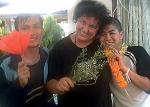Terrorists In Thailand
Tuesday, July 19th, 2005Last year Thaksin’s government sent in police militia to quell fundamentalist Islamic violence in a southern Thai province that is populated primarily with muslims. As a result over 60 combatants were kiilled. In retaliation, the jihadists continue to murder Buddhist monks and teachers as well as civilians in several southern provinces.
Today from the Christian Science Monitor:
Emergency rule was imposed on three provinces of southern Thailand wracked by violence in an Islamist rebel campaign to return the region to an independent sultanate. But critics said the move would be meaningless to residents there, many of whom consider the central government corrupt. More than 800 people have been killed since the violence erupted 19 months ago, two of them in the past two days.

